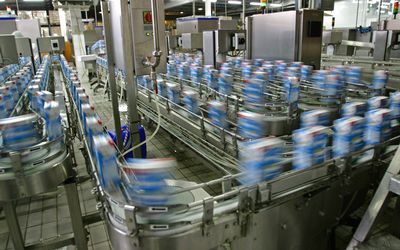THE Department of Trade and Industry is being threatened with a class action lawsuit by about 125 small and medium-sized manufacturers who say incentives they applied for from the R5bn Manufacturing Competitiveness Enhancement Programme have been rejected arbitrarily.
This follows the department’s change of the empowerment rules for applicants last year, "without prior notice to any person, including manufacturers" who had made applications using the criteria dated December 2012 — and before the department said that funds for the programme had been exhausted.
In October, the department announced the suspension of the programme’s funding, saying the number of applications had "far exceeded" the funds set aside for the programme.
It said it would continue to honour "all approved applications" and new ones would be accepted in April next year "pending (the) availability of funds".
But consultants providing services for applicants for the incentive programmes had told their clients that the department had said that if their applications had not yet been adjudicated, they would receive a rejection letter.
Many companies applying for funds believe the real reason for the programme’s suspension is that it is "poorly administered".
Malcolm Lyle, director of Chateau Gateaux in Durban, said the company was seeking legal advice and intended to do all it could to expose the department’s "extraordinary inefficiency, inconsistency and downright ignorance of the impact of their actions on business".
The maker of frozen cakes and desserts employed 48 people six years ago. Now it employs more than 250 workers after investing R60m in a new production facility.
Lyle said part of the justification for the investment was the expected receipt of R8m in funding from the department. "We had anticipated creating at least 500 more jobs over the next five years. This will now be severely curtailed," he said.
Lyle said the department did not respond to applicants or clarify their status for periods of more than 12 months.
"The failure of the department to monitor the total value of applications on a regular basis meant that they were not in a position to advise industry timeously of the end of the programme. Had they done this, industry would have been able to plan accordingly.
"Under these circumstances, it is unacceptable to us that applications submitted have been rejected. Our view is that applications lodged should have been adjudicated and industry should have been advised that no further applications would be accepted," Lyle said.
He said a class action, being handled by law firm ENSafrica in Johannesburg, was in progress against the department.
The manufacturing-enhancement programme was introduced soon after the 2008 global financial crisis to help manufacturers cope with poor markets, secure higher levels of investment, raise competitiveness and retain jobs.
It provided a cash grant to companies planning to upgrade machinery or buildings, or to invest in training — and was heavily oversubscribed.
Pippa Reyburn, a director in ENSafrica’s corporate commercial department specialising in public-private partnerships and public procurement, says to date the law firm has not instituted legal action on behalf of the companies "in any court".
She said the "most material changes" stemming from last year’s amendments to the programme rules related to the broad-based black economic empowerment (B-BBEE) status of grant applicants.
"Prior to April 2014, applicants had to be level four contributors under the department’s codes of good practice, or have a plan to get to level four within four years," Reyburn said.
"From April 2014, their plan had to get them to level four within two years. The amended rules also stated that from June 1 2015, they had to already be at level four to get approval.
"But there were many applications submitted prior to April 2014 which were compliant with the rules that existed when their applications were submitted, but had not yet been adjudicated at April 2014, and which did not meet — or know about — the subsequent requirements at the time of application.
"We are still waiting for a response from the Department of Trade and Industry to our representations and request for a meeting," she said.
The department’s deputy director-general for incentive development and administration, Malebo Mabitje-Thompson, denies they are inconsistent.
"From the inception of the Manufacturing Competitiveness Enhancement Programme in 2012, the department made it clear that this programme will also support transformation in the manufacturing sector."
This was "captured" in the programme’s guidelines of 2012 and was "consistently reiterated" in the April 2014 guidelines — companies had to either have achieved B-BBEE level four, or had a clear plan to reach that level within the incentive period.
Mabitje-Thompson said the department was "aware that some consultancy companies guaranteed manufacturers incentive support".
She said: "We are requesting the investing public to be mindful that the department only contracts with manufacturers after applications are approved, and payment follows achievement of agreed milestones."
Sam Waterson, manager at small plastics manufacturer Volume Injection Products in East London, says the announcement that the Manufacturing Competitiveness Enhancement Programme was suspended had been met with "shock and disbelief".
"We have in good faith achieved our (empowerment level three) ranking. We have sought asset finance to fund the company’s expansion, thus creating jobs in the Eastern Cape, where the employment rate is disproportionately high," he said.
"In light of the cancellation of the application and all future claims, the company can no longer justify our empowerment commitments. Any future transformation will be viewed in this light."






















Change: 0.41%
Change: 0.38%
Change: 0.99%
Change: 0.40%
Change: -0.76%
Data supplied by Profile Data
Change: 1.81%
Change: 0.60%
Change: 0.41%
Change: 0.00%
Change: 0.48%
Data supplied by Profile Data
Change: -0.80%
Change: -0.72%
Change: -0.72%
Change: -0.96%
Change: -0.76%
Data supplied by Profile Data
Change: 0.25%
Change: 0.67%
Change: 0.29%
Change: 1.29%
Change: 2.04%
Data supplied by Profile Data